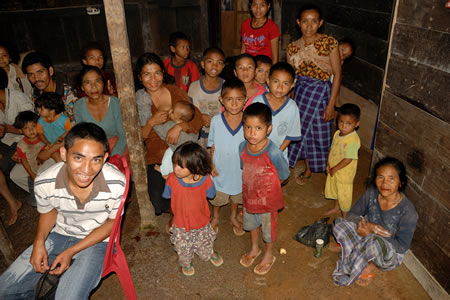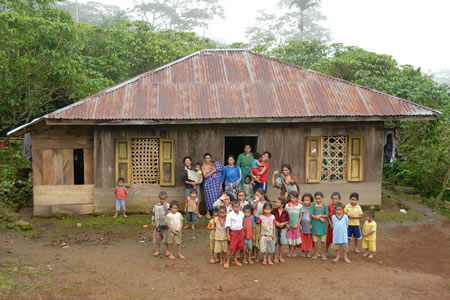

| As traditional as traditional can be | |
Moni (Indonesia), May 10th 2009 |
|
Ari is a boy of seventeen years old and he wants to become a guide. He studies on the school for tourism in Ruteng on the Indonesian Island of Flores and he is very eager to practise his English. Therefore, he approached us yesterday to accompany us during our afternoon walk through Ruteng. At the end of the afternoon, he asked whether he could join us today to show us the village where he was born. The fact that today is a normal school day isn’t a problem. Without any trouble, Ari gets dispensation from school when he can spend that day with tourists. At 7:00 a.m. sharp, Ari picks us up from our hotel. He is dressed in nice jeans and a bright white T-shirt. Normally, we can recognize guides from miles away because they just look too smart. Big shiny sunglasses, close fitting T-shirts, the newest mobile phone and a quick-witted mouth are part of the standard outfit of a typical guide. Ari will probably be that way in a few years, but for now he is a normal, nice guy. He is calm and polite and contrary to most people of his age, he doesn’t use a mobile phone. The day begins on our request with a visit to the local market. We want to buy some presents for the parents of Ari and he knows best what they like. For 10.000 Rupee (EUR 0,70) we buy a big bag with betelnut and for 15.000 Rupee (EUR 1,05) we a big amount of dried fish. Ari’s presence is very usefull, because he knows the local prices. Without him, we would have paid at least double. Even Ari has to bargain hard, because he is accompanied by “Booleh”. “Booleh” are white-skins and white-skins are seen as a kind of walking wallets. |
|
 |
|
Ari and a part of his family |
|
When we have bought the presents, we take the local bus to Rebak. Rebak is the place where Ari is born and we notice that he is getting a bit nervous when we get near. He is very proud that he can finally show his parents that he can talk with foreigners, but he also wants to ask for our understanding that there might be villagers who are afraid of us. Apparently, we are the first white-skins to visit the village and Ari doesn’t know how some people will react. He hopes also that we don’t mind that the lunch that his mother will prepare isn’t as “perfect” as in a restaurant. We reassure him that he doesn’t need to worry. Everything will be fine. As soon as we are walking on the dirt road leading to Rebak, we start meeting members of Ari’s family. We don’t know if it is truly family, as Ari calls everyone in this village family. Whether it is family or not, everybody seems really glad to meet us. Some are a bit nervous and shaky when they shake our hand and others are running hundreds of meters through the fields to see us up close. We meet the oldest brother of Ari and his wife. The difference with Ari couldn’t be bigger. The clothes he wears are old, dirty and worn-out and his flip-flops are repaired several times in a provisional way. However, he couldn’t be happier then when he saw his little brother accompanied by two tourists. With his meagre income, he pays part of the schooling of Ari and our visit is a sign for him that Ari is on the right track. After walking a few minutes more, we arrive at Ari’s mother’s house. Just like most houses in this village, this house doesn’t have electricity. Ari’s mother is trembling when she shakes our hand and she welcomes us in her house. She tells Ari that she is really proud to have us as her guests, but that she is also afraid that we might find her home to small and to dirty. This is absolutely not the case. We are very happy to be here! For many tourists who visit the Indonesian islands of Nusa Tengara, a visit to a “traditional” village is one of the highlights. Accompanied with a guide, they visit villages that have more souvenir shops than regular houses. Usually we avoid “traditional” villages, but by chance we ended up in a real traditional village today. While we are sitting in the living room, the whole village comes to visit us. The elder, more important men get a chair and the other people find a place on the floor. After a while, a woman gets out of the kitchen. It took her a while to get the courage to meet us. After shaking hands, she breaks into sobs and blows her nose in the collar of her shirt. For her, we are still a bit too white. |
|
 |
|
Time to say goodbye |
|
| After a nice cup of coffee, it is time for the elder people to take some betelnuts. We not taking any, but it is nice to see how much they like this kind of narcotics. Chewing betelnut makes the day brighter and in this village, people like to chew often and a lot. By chewing betelnut, the saliva turns red and this causes that the teeth of the chewers also become red. The bitter saliva isn’t swallowed but is spit on the floor. When chewing the betelnut, all nerves disappear and questions arise. Ari is getting a busy job translating, because everyone wants to know everything from us. After answering as much questions as possible, a simple but nice lunch is served. The rice with pumpkin, some fried noodles and the dried fish that we bought this morning taste very well. After lunch, Ari asks us to make some pictures of his family to send to him. We are glad with this request, because we had decided not to make any pictures. We did not want to take the risk that those friendly people would think that we want to capture their poverty. Because of the request of Ari, we can make some pictures to remind us of this nice day. The friendliness and the warmth of the people of this village have really surprised us. Also the poverty of the village has touched us. Its not that those people are the poorest that we have ever seen, but it is because the contrast between Ari and his family seems so big. For this family, Ari can be the one who can lift their standard of living to a higher level. If Ari succeeds, the whole family will gain from that. In that case, the support that they are giving him now will be paid back many times. Our visit is a sign for the family that Ari is on course and Ari is also full of confidence. “I will succeed, I know I will!” We admire the confidence that this seventeen year old boy has.
After spending several hours at the home of the mother of Ari, we walk for a while through the village. The “compang” is the main “sight” of this village. It is a round altar made of flat stones that it used for sacrificing buffalos and pigs to please the ancestors. While the whole village claims to be Roman Catholic and the houses are full with pictures from the Pope, animistic beliefs and traditions are still very important. Ari is also shining when he tells about the ceremonies that are being held. The western cloths that he wears are part of the image that he wants to have because he thinks that it is cool and because he hopes that it will help him to get in contact with tourists. However, the cloths are only for the outside. This village is his real home! The bus ride back to Ruteng is surrounded by some silence. We have got a lot of impressions to think about after this interesting day. Ibu Lisa (Ari’s mother) didn’t want to let go of our hand and we have never shook so many people’s hand on one day. After arriving in Ruteng, the time is really there to say goodbye to Ari. To thank Ari for this interesting day, we give him some money for his study and we wish him all the best. After a big hug he leaves and when we see him walking away, we question ourselves what we wish him for the future. Of course, we hope that he and his family will have a good and healthy future but we wander if Ari really has to become the typical kind of guide that we normally dislike. However, for now Ari is a perfect guide that we would recommend to everybody. A very nice guy who makes his village proud. © copyright - Babakoto.eu / 2009 |
|